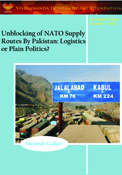… the hope is that Biden would have learnt from the Obama era mistakes and hence follow a non-interventionist policy to avoid another ‘humanitarian’ war … at the end of his Presidential term, Biden may emerge a ‘liberal crusader’ or be another ‘crumbling liberal hero’ …
The flow of oil through NATO's Pakistani supply lines is due to resume soon, one year after the attack by NATO troops on the Pakistani outpost at Salala. The decision comes after the first two test-run tankers passed safely through the Torkham crossing in the beginning of November, 2012. Earlier the logistical supply lines, but not the oil supply lines, were opened in July, 2012.
It is axiomatic that military aspects can not be discussed in isolation as many other factors have a direct impact on the given military situation. In the current Af-Pak scenario political and economic compulsions have a direct bearing on the behaviour of many players in the evolving Af-Pak imbroglio. Clausewitz opined that ‘war is a continuation of politics’ which in effect means that war or for that matter any military action can not be separated from political activity. Further, to execute any kind of national or military strategy adequate resources are required.



